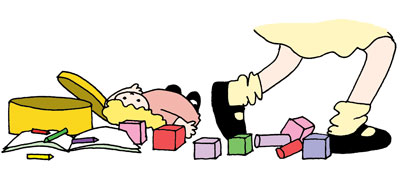“Whoever is slack in his work is a brother to him who destroys” (Proverbs 18:9, ESV).
 A child who is lazy will end up misplacing items, wasting resources, using up unnecessary time (his and others’), and losing the trust of others.
A child who is lazy will end up misplacing items, wasting resources, using up unnecessary time (his and others’), and losing the trust of others.
A parent who is lazy in his responsibilities to train his children will also have a destructive influence on their lives! Teach your children the truth of Proverbs 18:9 when their laziness leads to waste and destruction.
When a child’s carelessness has played a part in the destruction or damage of another’s possessions, he should be required to make restitution. If the item needs to be entirely replaced, the child should purchase it himself. If he does not have the money, he can work to pay his debt.
If he has destroyed the property of another child, he could do that child’s chores for him for a period of time. He could work for you if he has misplaced or destroyed a household item or personal possession of yours. If he has destroyed an item that belongs to someone outside your family, he could work for that person if such an arrangement is agreeable to all, or he could work for you and use his earnings to pay for the item.
For example, if the child’s laziness in laundry folding has left Daddy without any matching socks, he should be the one who is responsible to search through drawers and throughout the house for all the socks he can find, and then match them up and put them away properly. It would be good for him to also have additional work, preferably for Daddy, to compensate for the time his father has lost in vainly searching for socks. If no matching socks can be found any longer (where do they go?!), the child is responsible to purchase new ones for his father.
If the child has damaged an item, he should be involved in its repair. He can help wash or mend clothing that has been damaged due to carelessness, or he can do errands for Mama while she makes the repairs. If he has left his brother’s bike in the driveway, and Daddy drives over it when backing out onto the street, he should repair the bike, if he is able, or pay to have it repaired.
If the child has a habitual problem of being careless and wasteful with his own belongings, consider fining him for items left out. If this fails to motivate him, it is probably time to reduce the amount of belongings for which he is responsible. Take away items that he refuses to care for. Box up most of his clothes, or store his toys in the attic. It is difficult to be firm in this area, but it often seems to be the only way to teach a slothful child. Set items aside for an extended time period, and see if he is more faithful when they are later restored to him.
As parents, we also need to resist the temptation to replace an item for the child when he has not taken care of it properly. The little girl whose crayons are broken and lost because she is not willing to care for them properly, should not receive a shiny new box. Let her replace them with her own money or go without.
Help your children understand that their faithfulness with a few possessions will enable you to trust them with more. If you see that they are careless and ungrateful for what they already have, they should not be entrusted with more. Lovingly explain this, and remind them that God has entrusted them with blessings that they should gratefully accept and care for. If they are being responsible and thankful for what they have, commend them and be ready to bless them with more.
“For to everyone who has will more be given, and he will have an abundance. But from the one who has not, even what he has will be taken away” (Matt 25:29-30, ESV).

2 Trackbacks